'Quarantine stations,' Ebola questions, thermometers coming to 5 U.S. airports“檢疫站,”埃博拉病毒的問題,溫度計來5美國機場
- New airport screening measures will affect travelers from Guinea, Liberia and Sierra Leone
- They'll take effect at New York's JFK airport, then in Atlanta, Chicago, Newark and Dulles
- Official: U.S. can track those traveling from West Africa via connecting flights
- CDC director: "We can't get the risk to zero here in the interconnected world"
(CNN) -- One person has come to the United States and come down with Ebola here.
Authorities want to keep it that way.
To that end, the Centers for Disease Control and Prevention announced Wednesday beefed-up measures at five of America's biggest, busiest airports aimed at preventing the deadly virus' further spread.
While talk about preventing Ebola's spread abounds everywhere from coffee shops to TV news, this intervention won't affect a lot of people.
It applies only to about 150 people a day, by CDC Director Dr. Tom Frieden's estimate, arriving in the United States after having recently traveled from Ebolva-ravaged West African nations of Guinea, Liberia and Sierra Leone.
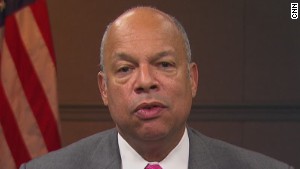
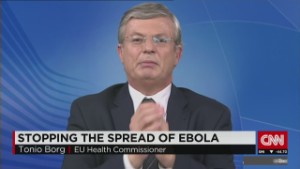
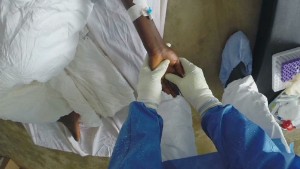
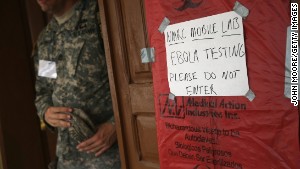
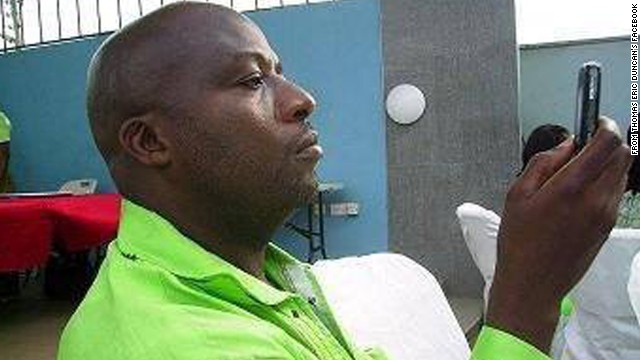
These travelers will get special treatment, including having their temperature taken and answering questions about whether they've been exposed to anyone with Ebola. The idea is to stop anyone with warning signs from getting past the airport gates, and into the U.S. public, before they can possibly spread the virus any further.
But, Frieden cautioned, this isn't some sort of magic solution.
U.S. officials will likely discover some people have fevers or have had contacts with Ebola sufferers, only to find out they don't have the virus. Someone can still unknowingly come to the United States and show no signs of it, since it can take up to 21 days for someone to feel sick. Plus, there are more ways than ever for people to cross communities, cross borders, cross oceans and spread a virus like Ebola.
"We are stepping up protection for people, (and) we will continuously look at ways that we can increase the safety of Americans," Frieden told reporters. "(But) whatever we do can't get the risk to zero here in the interconnected world that we live in today."
Can you catch Ebola on a plane?
New policy in place of 5 of America's busiest airports
Some of the measures to halt Ebola's spread are already happening -- in West Africa.
The U.S. government has been involved in efforts at international airports in the hardest-hit nations to question travelers about their health and exposure to Ebola, as well as take their temperature using what Frieden describes as FDA-approved devices.
During those screenings, 74 people with fevers and three more with other symptoms were stopped from boarding planes, according to Frieden. None of those are thought to have Ebola, something the CDC director attributed to the fact that high temperatures also are a symptom of malaria, a common ailment in Africa spread by mosquitoes, but not person-to-person.
The U.S. process for now will be in effect in only five airports -- where 94% of all travelers from West Africa enter the United States.
It will start Saturday at New York's John F. Kennedy International Airport, which has nearly half of all such passengers. The same thing will roll out next week at Dulles International Airport outside the nation's capital, Newark Liberty International Airport in northern New Jersey, O'Hare International Airport in Chicago and Hartsfield-Jackson Atlanta International Airport.
Here's how it will work.
It starts with U.S. authorities identifying anyone who'd recently been in West Africa, whether they flew in directly or via a connecting flight.
Alejandro Mayorkas, deputy secretary of the Department of Homeland Security, explained that "we have in our screening capabilities the ability to identify individuals traveling not only with respect to the last point of departure but the point of origin."
"So ... we can, in fact, identify the full journey of the individual arriving in the United States," said Mayorkas.
Customs and Border Protection -- the federal agency charged with safeguarding U.S. borders and airports -- will take the lead, escorting pinpointed travelers to a what Mayorkas called a "quarantine station." There, they will be asked questions about their health and possible exposure to Ebola, something that might tip off authorities that they might pose a risk.
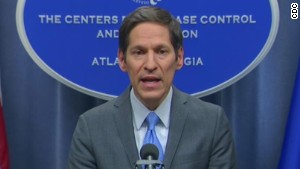
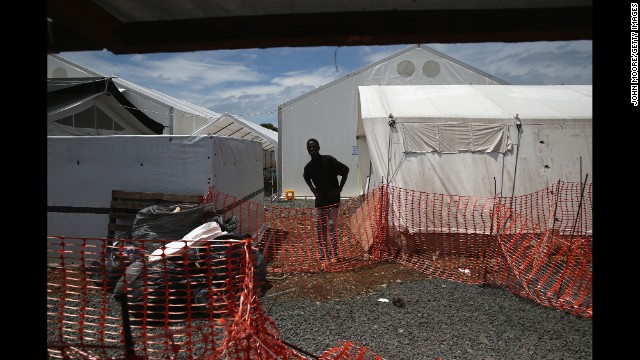

These CBP officers, who won't be wearing any masks, will also place a non-contact thermometer over travelers' foreheads to take their temperature, since having a fever is one symptom of Ebola.
If there are any red flags, the person will be evaluated by a CDC public health officer on site. He or she will then be given the OK to go, taken to a hospital or be referred to a local health department for monitoring and support.
All passengers who fly from West Africa will be given information about how to monitor themselves for possible symptoms, will be asked to log their temperature daily and be asked to provide their contact information to authorities.
Debate if more travel restrictions necessary
The only person to be diagnosed with Ebola in the United States, Thomas Eric Duncan, died Wednesday in a Dallas hospital.
Duncan traveled from Liberia, via Belgium, before arriving in Texas on September 20. It's not likely the stepped-up screening would have affected him, according to Frieden, because he didn't appear to show signs of the virus until a few days after his arrival.
There are many more like him, people who have spent time in West Africa and been exposed, whether they know it or not, to the disease. Frieden called the outbreak "unprecedented," given how quickly its spread through the regions.
According to the World Health Organization, more than 800 people have been infected with Ebola and at least 3,800 have died. Authorities have said the actual numbers are probably much higher, because many people may have died before authorities firmly identified Ebola as a cause, and others -- like Duncan -- may have the disease without knowing it or reporting it to officials.
And things aren't getting any better. According to a WHO update released Wednesday, "the situation in Guinea, Liberia and Sierra Leone continues to deteriorate, with widespread and persistent transmission of (Ebola)."
This alarming trend -- and the fact that there's been at least one person to bring Ebola unknowingly into the United States -- has spurred some calls to stop on all travel into the United States from West Africa so long as the virus is spreading.
Sen. Bill Nelson, a Florida Democrat, has publicly urged Secretary of State John Kerry to suspend U.S. travel visas of those from the affected region for any "unnecessary travel" and not to issue new visas.
The Rev. Jesse Jackson, a prominent civil rights leader who has served as a spokesman for Duncan's family, argued that such measures will hurt the economies of longtime American allies such as Liberia.
"We should quarantine the disease, not quarantine nations and not quarantine airline flights," the civil rights leader said. "We should not panic."
Frieden, the CDC director, also spoke against such a ban, arguing that severe travel restrictions will create more problems than they solve.
"It makes it hard to get health workers in, because they can't get out," he said. "If we make it harder to respond to the outbreak in West Africa, it will spread not only in those three countries (in West Africa hit hardest by Ebola) but to other parts of Africa and ultimately increase the risk here" in the United States."
“檢疫站,”埃博拉病毒的問題,溫度計來5美國機場
由格雷格·博特略,美國有線電視新聞網
2014年10月9日 - 更新0056 GMT(0856 HKT)
您的視頻將開始瞬間。
新聞提要
新機場的檢查措施會影響旅客來自幾內亞,利比里亞和塞拉利昂
他們會生效,在紐約的肯尼迪國際機場,然後在亞特蘭大,芝加哥,紐瓦克和杜勒斯
官方:美國可以跟踪那些從西非通過旅行轉機
疾控中心主任:“我們不能讓風險來這裡零,在相互關聯的世界”
(CNN) -一個人已經到了美國,並回落埃博拉這裡。
當局希望繼續保持這種方式。
為此,該中心疾病控制與預防週三宣布加強的措施五美國最大,最繁忙的機場,旨在防止這種致命病毒“進一步擴散。
雖然談預防埃博拉病毒的蔓延盛產無處不在,從咖啡館到電視新聞,這種干預不會影響很多人。
最近有來自幾內亞,利比里亞和塞拉利昂Ebolva蹂躪的西非國家遊歷後,僅適用於150人左右,每天由疾病預防控制中心主任醫師湯姆·弗里登估計,抵達美國。
JEH約翰遜:埃博拉病毒爆發'管理' 博格:我們不能孤立西非 通過護士的眼睛埃博拉戰 “氣勢磅礴”美國在利比里亞
誰\'S誰在埃博拉病毒爆發? 誰是誰的埃博拉病毒爆發?
這些旅客將獲得特殊待遇,包括讓它們的溫度取並回答他們是否已經接觸到任何人與埃博拉病毒的問題。這樣做是為了阻止任何人以警示牌從過去獲得的機場大門,進了美國公眾,才可以有可能進一步傳播病毒。
不過,弗里登警告,這是不是某種神奇的解決方案。
美國官員可能會發現一些人有發燒或曾與埃博拉病毒患者接觸,才發現他們沒有病毒。有人仍然可以在不知不覺中來到美國,並顯示它的任何跡象,因為它可能需要長達21天為一個人感到噁心。另外,也有比以往任何時候人們跨越社區,跨邊界,跨海洋,傳播病毒埃博拉病毒一樣更多的方式。
“我們正在加緊保護的人,(和),我們將繼續研究如何,我們可以增加美國人的安全,”弗里登對記者說。“(但)無論我們做什麼不能去這裡零,因為我們今天生活的世界相互聯繫的風險。”
您可以搭乘埃博拉在飛機上?
代替5美國最繁忙的機場新政策
一些措施來阻止埃博拉病毒的傳播已經發生 - 在西非。
美國政府一直參與努力在受災最嚴重的國家的國際機場旅客質疑對自己的健康和接觸埃博拉病毒,以及使用什麼弗里登描述為FDA批准的設備需要它們的溫度。
在這些場次,74人有發燒和三個其他症狀登機飛機停了下來,根據弗里登。這些都不被認為有埃博拉病毒,一些疾病預防控制中心主任歸因於一個事實,即較高的溫度也為瘧疾的症狀,在非洲常見的疾病由蚊子傳播,而不是人對人。
美國的過程,現在將生效的只有五個機場 - 其中來自西非的所有旅客的94%進入美國。
這將開始週六在紐約的肯尼迪國際機場,其中有將近一半的此類乘客。同樣的事情也將在下週推出,在杜勒斯國際機場的國家的首都,紐瓦克自由國際機場在新澤西州北部,奧黑爾國際機場,芝加哥和亞特蘭大哈茲菲爾德 - 傑克遜亞特蘭大國際機場外。
下面是它如何工作。
它開始與美國當局確定任何人誰願意最近在西非,無論他們直接或通過中轉航班飛走了。
亞歷杭德羅·Mayorkas,美國國土安全部副部長解釋說,“我們已經在我們的篩選能力,以識別個人,不僅相對於過去的出發點,但原點行駛的能力。”
“那麼......我們可以,其實,識別抵達美國個人的全程,說:”Mayorkas。
海關和邊境保護-聯邦機構,負責保衛美國邊境和機場-將帶頭,點名旅客護送到什麼Mayorkas稱為“檢疫站” 在那裡,他們將被要求對自己的健康和可能的暴露問題埃博拉,一些可能通風報信當局,他們可能會帶來風險。
疾病預防控制中心:我們不能讓我們埃博拉病毒的風險為零
組圖:埃博拉疫情在西非 組圖:埃博拉疫情在西非
通過護士的眼睛埃博拉戰
這些CBP官員,誰也不會戴任何面具,也將放置一個非接觸式溫度計在遊客額頭上取它們的溫度,因為發燒是埃博拉病毒的症狀之一。
如果有任何的紅旗,此人將在現場疾病預防控制中心公共衛生官員進行評估。他或她將被給予確定去,送到醫院或轉診至當地衛生部門進行監測和支持。
完全覆蓋埃博拉
所有乘客誰從西非飛將給出關於如何監控自己的可能的症狀,將被要求每天記錄它們的溫度和被要求提供他們的聯繫信息給當局的信息。
如果有更多的旅行限制必要的辯論
唯一的人被診斷為埃博拉病毒在美國,托馬斯·埃里克·鄧肯,在達拉斯的醫院去世週三。
鄧肯利比里亞旅行,經比利時,9月20日這是不太可能的加緊篩選會影響到他在抵達得克薩斯州之前,根據弗里登,因為他似乎沒有表現出這種病毒的跡象,直到幾天後他的到來。
在得克薩斯州的埃博拉患者死亡
還有更多像他一樣,誰花的時間在西非和人接觸過,無論他們知道與否,本病。弗里登稱爆發“前所未有”,因為其經過的地區如何迅速蔓延。
根據世界衛生組織,超過800人被感染了埃博拉病毒和至少3800人死亡。當局表示,實際數字可能更高,因為很多人可能會當局堅定地識別埃博拉病毒的原因,和其他人之前已經死了-就像鄧肯-可能有疾病而不自知或報告它的官員。
而事情並沒有得到任何改善。據世界衛生組織更新週三公佈,“幾內亞局勢,利比里亞和塞拉利昂的不斷惡化,(埃博拉)的廣泛和持久的傳播。”
這令人震驚的趨勢 - 而事實上,有許多人至少有一人攜帶埃博拉不知不覺中進入美國 - 促使一些呼籲停止所有旅遊進入美國從西非,只要該病毒正在蔓延。
參議員比爾·納爾遜,佛羅里達州的民主黨人,曾公開呼籲國務卿克里暫停美國遊者從受影響地區的簽證,任何“不必要旅行”,不發放新的簽證。
牧師傑西·傑克遜,誰曾作為發言人鄧肯的家人一個突出的民權運動領袖,認為這些措施將傷害美國的長期盟友,如利比里亞的經濟體。
“我們應該隔離的疾病,而不是隔離的國家,而不是隔離航空公司航班”的民權領袖說。“我們不應該恐慌。”
弗里登,疾病預防控制中心主任,也發言反對這項禁令,認為嚴重的旅遊限制會造成更多的問題比解決的問題。
“這使得它很難得到衛生工作者,因為他們不能出去,”他說。“如果我們使其難以在西非爆發做出反應,它會蔓延非洲不僅在這三個國家(西非經埃博拉受災最嚴重),但其他部分,並最終在這裡增加的風險”在美國“



 留言列表
留言列表
 {{ article.title }}
{{ article.title }}

